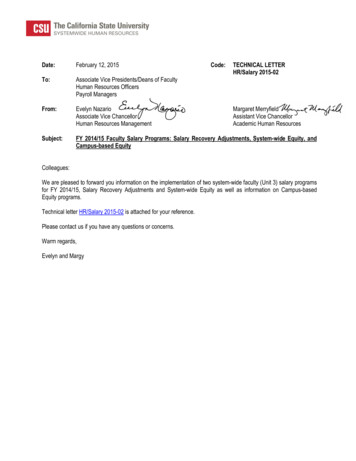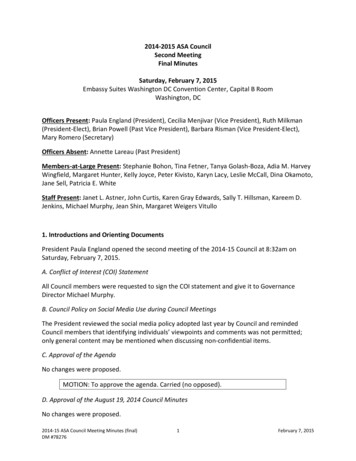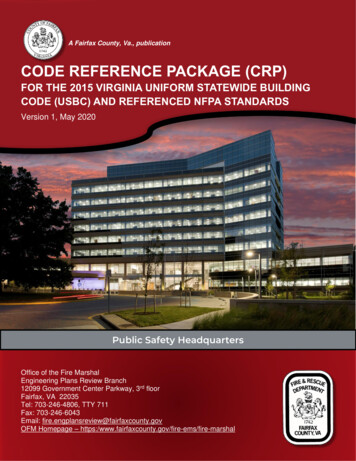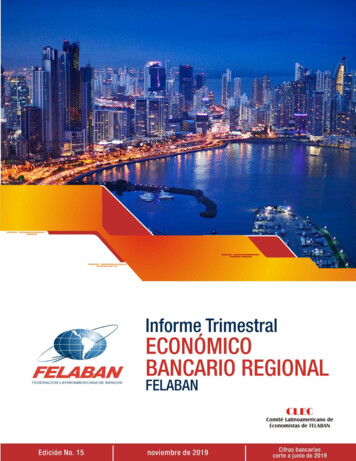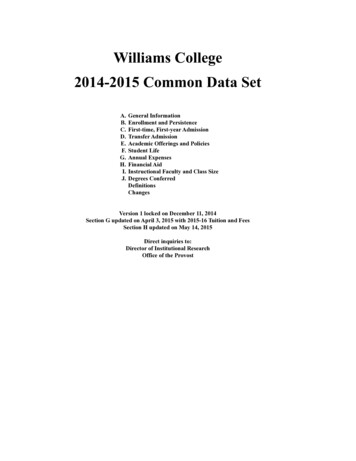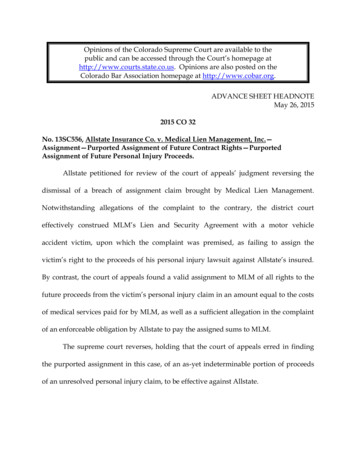
Transcription
123456789012345Opinions of the Colorado Supreme Court are available to thepublic and can be accessed through the Court’s homepage athttp://www.courts.state.co.us. Opinions are also posted on theColorado Bar Association homepage at http://www.cobar.org.ADVANCE SHEET HEADNOTEMay 26, 20152015 CO 32No. 13SC556, Allstate Insurance Co. v. Medical Lien Management, Inc.—Assignment—Purported Assignment of Future Contract Rights—PurportedAssignment of Future Personal Injury Proceeds.Allstate petitioned for review of the court of appeals’ judgment reversing the6dismissal of a breach of assignment claim brought by Medical Lien Management.7Notwithstanding allegations of the complaint to the contrary, the district court8effectively construed MLM’s Lien and Security Agreement with a motor vehicle9accident victim, upon which the complaint was premised, as failing to assign the0victim’s right to the proceeds of his personal injury lawsuit against Allstate’s insured.1By contrast, the court of appeals found a valid assignment to MLM of all rights to the2future proceeds from the victim’s personal injury claim in an amount equal to the costs3of medical services paid for by MLM, as well as a sufficient allegation in the complaint4of an enforceable obligation by Allstate to pay the assigned sums to MLM.5The supreme court reverses, holding that the court of appeals erred in finding6the purported assignment in this case, of an as-yet indeterminable portion of proceeds7of an unresolved personal injury claim, to be effective against Allstate.
1234The Supreme Court of the State of Colorado52015 CO 32678Supreme Court Case No. 13SC556Certiorari to the Colorado Court of AppealsCourt of Appeals Case No. 12CA6919Petitioner:0Allstate Insurance Company, an Illinois corporation,1v.2Respondent:3Medical Lien Management, Inc., a Colorado corporation.456Judgment Reversed7890123456789012345672 East 14th Avenue Denver, Colorado 80203en bancMay 26, 2015Attorneys for Petitioner:Wheeler Trigg O’Donnell LLPTerence M. RidleyEvan StephensonDenver, ColoradoLyda Law Firm LLCMark E. LydaDenver, ColoradoAttorneys for Respondent:Robinson, Waters & O’Dorisio, P.C.Zachary P. MuggeDenver, ColoradoAttorneys for Amici Curiae Colorado Civil Justice League and Colorado DefenseLawyers Association:Ruebel & Quillen, LLCJeffrey Clay RuebelCasey QuillenWestminster, Colorado
1234567890123456789012345678901234567890123JUSTICE COATS delivered the Opinion of the Court.2
¶1Allstate petitioned for review of the court of appeals’ judgment reversing thedismissal of a breach of assignment claim brought by Medical Lien Management.Notwithstanding allegations of the complaint to the contrary, the district courteffectively construed MLM’s Lien and Security Agreement with a motor vehicleaccident victim, upon which the complaint was premised, as failing to assign thevictim’s right to the proceeds of his personal injury lawsuit against Allstate’s insured.By contrast, the court of appeals found a valid assignment to MLM of all rights to thefuture proceeds from the victim’s personal injury claim in an amount equal to the costsof medical services paid for by MLM, as well as a sufficient allegation in the complaintof an enforceable obligation by Allstate to pay the assigned sums to MLM.¶2Because the court of appeals erred in finding the purported assignment in thiscase, of an as-yet indeterminable portion of proceeds of an unresolved personal injuryclaim, to be effective against Allstate, the judgment of the court of appeals is reversed.I.¶3In 2010, Medical Lien Management, Inc., a medical debt company, brought suitagainst Allstate Insurance Company and Fred Martinez, a person injured in a motorvehicle accident with Allstate’s insured. MLM’s complaint alleged that in March 2007,in exchange for MLM’s agreeing to pay for Martinez’s medical treatment, he and MLMentered into a “Lien and Security Agreement” providing, among other things, thatMartinez granted MLM a lien on any and all proceeds derived from his personal injuryclaim in an amount equal to the fees and costs of medical care “performed and to beperformed” on Martinez. The complaint further alleged that in April 2007, a month3
after the Agreement was signed, MLM sent Allstate, the insurer of the tortfeasor, anotice, entitled “Notice of Lien or Assignment of Proceeds,” informing Allstate of theAgreement and instructing Allstate to issue all payments on behalf of its insured toMLM. The complaint alleged that MLM ultimately paid for 9,938 worth of medicalexpenses for Martinez. In addition, it alleged that Martinez settled his tort claim againstAllstate’s insured in October 2008 and that Allstate issued payment on behalf of itsinsured directly to Martinez, rather than to MLM, notwithstanding the instructions inMLM’s Notice. Finally, the complaint alleged that Martinez failed to pay MLM asrequired by the Agreement.In its complaint, MLM asserted claims of breach ofcontract, account stated, and unjust enrichment against Martinez, and breach ofassignment against Allstate.¶4Based in large part on the terms of the Agreement itself, Allstate moved pursuantto Rule 12(b)(5) of the Colorado Rules of Civil Procedure for dismissal of MLM’s breachof assignment claim, asserting that it failed to state a claim upon which relief could begranted. The district court granted Allstate’s motion, concluding in pertinent part thatthe Agreement simply failed to assign Martinez’s right to proceeds from his personalinjury lawsuit, and instead merely authorized Allstate to pay MLM directly. AfterAllstate’s dismissal from the case, MLM’s claims against Martinez proceeded to ajudgment for MLM.After the judgment became final, MLM appealed the districtcourt’s order dismissing its claim for breach of assignment against Allstate.¶5The court of appeals reversed, concluding that the language of the Agreementsufficiently evidenced an intent by the parties to effect a present transfer of that portion4
of Martinez’s future personal injury recovery equal to the fees and costs of servicesprovided to him by MLM. From the allegations of the complaint itself, the incorporatedNotice of Lien or Assignment of Proceeds, and an account statement detailing the costsof treatment, the court further found an adequate allegation that Allstate was on noticeof the assignment. Finally, the court concluded that an assignment, as alleged by MLM,of the prospective proceeds of Martinez’s personal injury claim against Allstate’sinsured, ultimately resolved in this case by settlement agreement, would be effectiveand enforceable against Allstate as Martinez’s obligor.¶6With regard to the alleged assignment’s effectiveness, or enforceability, asagainst Allstate, the intermediate appellate court relied both on authorities concerningthe assignability of future or conditional contractual rights and authorities concerningthe assignability of proceeds of a personal injury suit that had not yet been reduced tojudgment. With regard to the assignability of future or conditional contractual rights, inparticular, the appellate court expressly declined to follow, at least as it would apply tothe settlement of personal injury claims, another panel’s understanding of theRestatement of Contracts as finding ineffective purported assignments of futurecontractual rights. Instead the appellate court in this case understood the Restatementto sanction the assignment of future and conditional rights in contract, including rightscreated by the settlement agreement in this case.¶7Allstate sought and we granted further review of the appellate court’sdetermination that, as a matter of law, Martinez’s rights in the prospective settlement of5
his personal injury lawsuit were assignable in a manner legally binding on his obligor,Allstate.II.¶8As both the court of appeals and district court were fully aware, the legal importof instruments, agreements, and other authorities upon which a complaint necessarilydepends, and which are therefore either expressly or impliedly incorporated by it, are tobe taken into account in ruling on a motion to dismiss for failure to state a claim. SeeDenver Post Corp. v. Ritter, 255 P.3d 1083, 1088 (Colo. 2011); see generally 2 James W.Moore, Moore’s Federal Practice § 12.34[2], at 12-87 to -91 (3d ed. 2015). Taking intoaccount the legal import of the Lien and Security Agreement and Notice of Lien orAssignment of Proceeds referenced in the complaint, Allstate’s motion to dismiss wouldhave been properly granted if MLM could prove no set of facts in support of its claimwhich would entitle it to relief. Qwest Corp. v. Colo. Div. of Prop. Taxation, 2013 CO39, ¶ 12, 304 P.3d 217, 221.¶9While the statutes of this jurisdiction implicitly acknowledge the existence andcontinued enforceability of assignments, by circumscribing their effect in various waysand with regard to various specific rights or interests, see, e.g., § 5-3-206(1), C.R.S. (2014)(prohibiting assignment of earnings for payment or as security in consumer credittransactions); § 5-10-502(1)(a), C.R.S. (2014) (prohibiting assignment of earnings inrental purchase agreements); § 13-64-209, C.R.S. (2014) (restricting assignment careprofessionals);§§ 8-9-101 to -107, C.R.S. (2014) (limiting assignment of wages); §§ 13-23-101 to -108,6
C.R.S. (2014) (governing assignment of structured settlements), and by expresslyproviding for assignments of specific rights or interests in limited circumstances, see,e.g., § 10-16-106.7, C.R.S. (2014) (allowing but not requiring assignments of healthinsurance benefits to licensed health care providers in exchange for services provided);§ 8-41-203(1)(b) (assigning, upon payment of workers’ compensation and as a matter ofstatute, cause of action of injured worker against tortfeasor to payer of compensation),the revised statutes do not purport to define the legal concept of assignment or describethe scope of its applicability. Taken generally as a transfer of rights or property fromone person to another, see Black’s Law Dictionary 142 (10th ed. 2014), the cognizabilityand effect on third parties of the right of assignment have developed as, and in thisjurisdiction largely remain, matters of court-made law. See Damaskus v. McCartyJohnson Heating & Eng'g Co., 295 P. 490, 491 (Colo. 1931) (embracing plaintiff’scontention that “[t]he validity of assignments, except as otherwise provided by statute,is to be determined on principles of the common law”); see, e.g., Condo v. Conners, 266P.3d 1110, 1112, 1116–19 (Colo. 2011) (looking to the Restatement (Second) of Contractsto resolve dispute regarding assignment of contractual rights).1¶10The concept of assignment has evolved considerably over time, adapting toemerging commercial realities and involving much interplay between actionsWhile the law of assignments is largely court-made law, Article 9 of the UniformCommercial Code now provides a statutory framework for security interests often usedto accomplish the same ends as assignments. See generally §§ 4-9-101 to -809, C.R.S.(2014). In many commercial sectors, Article 9 has superseded assignment. 3 E. AllanFarnsworth, Farnsworth on Contracts § 11.2, at 67–68 (3d ed. 2004). Whatever themerits of such a claim might be for the facts alleged, MLM did not pursue an Article 9security interest here.17
cognizable in law and those cognizable in equity. See generally 9 John E. Murray, Jr.,Corbin on Contracts § 47.3 (Joseph M. Perillo ed., rev. ed. 2007); 3 E. Allan Farnsworth,Farnsworth on Contracts § 11.2 (3d ed. 2004). While an assignment is not itself acontract, Farnsworth, supra, § 11.3, at 70, assignments often appear in contracts, andrights created by executory contracts, as quintessential “choses in action,” have longbeen accepted as interests that are generally assignable, see id. §§ 11.1–11.2.TheAmerican Law Institute’s Restatements of Contracts therefore extensively treat thehistorical development of assignments and present the modern law of assignment ofcontracts as a single system of rules. See Corbin, supra, § 47.3, at 137. Both this courtand the court of appeals have therefore looked to these Restatements as persuasiveauthority concerning the law of assignments.See, e.g., Condo, 266 P.3d at 1112,1116–19; In re Marriage of Lipira, 621 P.2d 1390, 1391 (Colo. App. 1980).¶11By its very nature, an assignment of a right affects anyone of whom that rightdemands a performance. As explained by the Restatement (Second) of Contracts, “Anassignment of a right is a manifestation of the assignor’s intention to transfer it by virtueof which the assignor’s right to performance by the obligor is extinguished in whole orin part and the assignee acquires a right to such performance.” Restatement (Second) ofContracts § 317(1) (1981). While contract rights are held to be generally assignable,Parrish Chiropractic Ctrs., P.C. v. Progressive Cas. Ins. Co., 874 P.2d 1049, 1052 (Colo.1994), the Restatement specifies various circumstances in which that will not be thecase, including when forbidden by statute or public policy, and whenever it wouldmaterially change the duty of the obligor or materially increase the burden or risk8
imposed on him. Restatement (Second) of Contracts § 317(2); see Farnsworth, supra,§ 11.4, at 79–85; § 4-2-210(2), C.R.S. (2014); cf. Parrish Chiropractic, 874 P.2d at 1053(noting that non-assignment clauses in insurance policies are strictly enforced againstattempted pre-loss transfers because such assignments materially increase insurers’ riskor obligation).¶12It has also commonly been noted that the concept of an assignment as a presenttransfer that extinguishes a contract right in the assignor and recreates that right in theassignee logically requires an existing right in the assignor. See Corbin, supra, § 50.1, at223; see also Patton v. Coen & Ten Broeke Carriage Mfg. Co., 3 Colo. 265, 268 (1877).The conceptual and practical difficulties surrounding the transfer of property not yetacquired by the transferor have resulted in various rationales, distinctions, and resortsto equitable principles to justify different outcomes with regard to interests of differentnatures. See generally Farnsworth, supra, § 11.5. But to the extent the court of appealsunderstood the Restatement (Second) of Contracts to treat future and conditionalcontract rights identically, as assignable interests, or understood the Restatement toinclude within its reference to “conditional” rights the prospective proceeds of apersonal injury lawsuit, prior to settlement or judgment, we believe it simply misreadthe Restatement.¶13By “conditional” rights the Restatement expressly refers to rights created by anoption contract or made conditional on the performance of a return promise orotherwise made conditional by an existing contract; and with regard to such rights, itmakes clear that their conditional nature does not prevent their assignment before the9
condition actually occurs. Restatement (Second) of Contracts § 320. For purposes ofassignment, rights arising under a contract are treated as existing from the moment ofthe contract’s formation, even though the chance may be slight that a duty of immediateperformance will ever arise. Id. § 321 cmt. a. With regard to future contract rights,however, the Restatement makes equally clear that a purported assignment of a rightexpected to arise under a contract not yet in existence operates only as a promise toassign the right when it arises and as a power to enforce it. Id. § 321(2). Dependingupon various factors, including whether the promise was given for value, it may beenforceable in some manner against the promisor, but it does not constitute anassignment of future or after-acquired rights so as to be effective against the promisor’sobligor. Id.¶14Some confusion regarding this proposition may arise from the separate treatmentby the Restatement (Second) of Contracts of the different topics, “What Can BeAssigned or Delegated,” in sections 317 to 323, and “Mode of Assignment orDelegation,” in sections 324 to 330. With regard to the Mode of Assignment, section 330specifies that a contract to make a future assignment of a right, or to transfer proceedsto be received in the future by the promisor, is not an assignment at all; however, exceptas provided by statute, the effect of such a contract on the rights and duties of theobligor and third persons must be determined by the rules relating to specificperformance of contracts. A comment notes that even though it does not constitute apresent assignment, under some circumstances the promisee in such a contract mayhave a right to specific performance; and if the promise is one that can be enforced10
against third parties, such a right resembles that of an assignee and is sometimesreferred to as an “equitable assignment” or “equitable lien.” Id. § 330 cmt. c.¶15Apart from the fact that the remedy of specific performance is generallyunavailable unless the promisee’s remedy in damages would be inadequate, see id.§ 359(1), in this case MLM has not pleaded a contract with Martinez to make a futureassignment or a contract to transfer proceeds to be received in the future, much less theenforceability of such a contract against a third party like Allstate or any justification ordemand whatsoever for specific performance. Quite the contrary, in its Answer beforethis court MLM appears to disclaim any such theory, and nothing in the court ofappeals’ opinion suggests reliance on the circumstance identified by section 330.¶16Beyond disclaiming a contract to make a future assignment or to transferproceeds to be received in the future, MLM would have us understand the court ofappeals’ rationale as not depending on resolution of Martinez’s personal injury claim bysettlement agreement at all. Notwithstanding the court of appeals’ emphasis on thecontractual nature of a settlement agreement, MLM argues that its conclusion isultimately justified simply by the fact that proceeds of litigation are assignable, evenbefore judgment or settlement in the case. Whether or not an effective assignment ofthe proceeds of a personal injury claim before judgment might be cognizable undersome circumstances, because the Agreement in this case purports to grant a right topayment for medical services not yet performed or knowable, it cannot fairly beunderstood to assign the proceeds, or even a determinable portion of the proceeds, ofMartinez’s personal injury suit.11
¶17With regard to the assignment of claims or causes of action, as distinguishedfrom the assignment of what was referred to at law as the “chose in possession” or“chose in action” itself, we have at times relied on the general rule that assignability anddescendibility go hand in hand. See, e.g., Kruse v. McKenna, 178 P.3d 1198, 1200 (Colo.2008); Micheletti v. Moidel, 32 P.2d 266, 267 (Colo. 1934). And while the statutes of thisjurisdiction do not directly provide for the assignability of causes of action, they doprovide for their descendibility. See § 13-20-101, C.R.S. (2014). In this regard, thepredecessor of the current statutory provision expressly excluded from survival thoseactions of “trespass for injuries done to the person,” along with “actions on the case forslander or libel,” § 5383, C.L. (1921); see also Micheletti, 32 P.2d at 267. By contrast, thecurrent statute bars the survival of causes of action for libel or slander; but with regardto personal injury claims, it simply limits the damages recoverable after the death of theperson in whose favor such action has accrued to loss of earnings and expensessustained or incurred prior to death, and prohibits damages for pain, suffering,disfigurement, and prospective profits or earnings after date of death. § 13-20-101.Although the court of appeals appeared to conclude that a claim for personal injurywould now be assignable; and although another provision of the Agreement expresslypurported to assign to MLM “any and all causes of action to the extent of the sums dueunder this Lien and Security Agreement that Patient might have or that may exist inPatient’s favor”; we need not opine on the current assignability of personal injuryclaims in this jurisdiction both because the complaint in this case did not allege the12
breach of such an assignment and because MLM did not pursue Martinez’s personalinjury claim as the real party in interest.¶18Were a cause of action for personal injury now fully assignable in Colorado, wewould rank among an extremely small minority of jurisdictions. See Anthony J. Sebok,The Inauthentic Claim, 64 Vand. L. Rev. 61, 74–75 (2011) (“The most important currentlimitation, universally enforced except in Texas, and to a lesser extent Mississippi,prohibits the assignment of causes of action for personal injuries.” (footnotes omitted));R.D. Hursh, 40 A.L.R.2d 500 § 5.5 (originally published in 1955). Even withoutacknowledging the assignability of personal injury actions, however, a not insignificantnumber of jurisdictions recognize the assignability of proceeds from a personal injuryaction, even before judgment or settlement in the case.See Andrea G. Nadel, 33A.L.R.4th 82 § 3(a) (originally published in 1984); Sebok, supra, at 82. With regard tothe conceptual difficulty of transferring an interest or right that the purported transferordoes not yet have and of which he may not be assured, some jurisdictions noted by thecourt of appeals and MLM conclude, although perhaps not on a common or consistentrationale, that the proceeds of a specific claim for personal injury are sufficiently extantat any time after the injury has occurred. Sebok, supra, at 82. While a specific amountto be recovered by the holder of the claim may not yet be determinable at that stage, thefund constituting any recovery to which the holder of the claim will be entitled, or evenan expressly identified percentage of it, is already well defined.¶19By contrast, the language of the Agreement found by the court of appeals toadequately evidence an intent to assign did not purport to assign the proceeds of13
Martinez’s claim or even an identifiable percentage of them. Instead, it “grant[ed] toMLM all rights to payment from any and all proceeds derived from the patient’s claimor claims for personal injury in an amount equal to fees and costs of services providedto patient.”(Emphasis added).Quite apart from the conceptual difficulty oftransferring to another something one does not yet have, the assignment purported bythis language would violate another basic precept of assignment law, applicable tocontractual and non-contractual rights alike: that substitution of a right in favor of theassignee for a right in favor of the assignor may not materially increase the burden orrisk on the obligor. See Farnsworth, supra, § 11.4; see also Restatement (Second) ofContracts § 317(2)(a); § 4-2-210(2); cf. People v. Adams, 243 P.3d 256, 261 (Colo. 2010)(noting that Colorado law disallows assignments involving matters of personal trustand confidence or personal service).¶20While ancient limitations on partial assignments have largely been abandoned, itnevertheless remains essential that the assigned portion of a right or interest beidentified by fraction, amount, or otherwise, with sufficient precision to put the obligoron notice of the extent of the assignment. See, e.g., Restatement (Second) of Contracts§ 326(1); see also 6A C.J.S. Assignments § 60 (2004) (“The subject matter of anassignment must be described with such particularity as to render it capable ofidentification.”); cf. C.R.C.P. Ch. 23.3, Rule 5 (requiring that a lawyer’s contingent fee—which is protected by statutory lien, see § 12-5-119, C.R.S. (2014)—be specified byprecise percentage in fee agreement). By purporting to grant MLM a right to no morethan payment from the proceeds in an amount equal to the fees and costs of services14
provided by MLM, the Agreement would, at the very least, impose on Allstate asobligor the additional burden of determining the point at which those fees and costsshould be measured and of resolving any disputes in this regard between the purportedassignor and purported assignee. With regard to the latter, the very claim againstAllstate in this case is premised on the assertion that Martinez declined, for whateverreason, to reimburse MLM as was also required by the Agreement; and with regard tothe former, apart from the fact that the accounting presented to Allstate clearly includescosts allegedly incurred after the purported assignment, even MLM acknowledges thisadditional burden, asserting merely that it can be overcome by joining the purportedassignor and assignee as defendants in a court action and requiring them to interpleadtheir respective claims. See generally C.R.C.P. 22. Moreover, an error in the abovedeterminations could expose Allstate to risk of a third-party bad faith claim brought byits insured. See Goodson v. Am. Standard Ins. Co. of Wis., 89 P.3d 409, 414 (Colo. 2004)(“Third-party bad faith arises when an insurance company acts unreasonably ininvestigating, defending, or settling a claim brought by a third person against itsinsured under a liability policy.”). On its face, a purported assignment of an interest soill-defined as to require the assignor’s obligor to independently determine and verifythe extent of the assignor’s indebtedness to the assignee, possibly resorting to courtaction to do so, imposes an impermissible additional burden and risk on the obligor.¶21Whether a cause of action for personal injury is now assignable in thisjurisdiction and, even if not, whether the recovery from a personal injury claim isassignable before it is reduced to settlement or judgment are questions that need not be15
resolved in this case. It is enough that the language of the Agreement from which thecourt of appeals found adequate allegation of a claim upon which relief could begranted failed to describe as an assigned interest either an existing contract right or adeterminable portion of the proceeds of a personal injury claim.III.¶22Because the court of appeals erred in finding the purported assignment in thiscase, of an as-yet indeterminable portion of proceeds of an unresolved personal injuryclaim, to be effective against Allstate, the injured person’s alleged obligor, the judgmentof the court of appeals is reversed.16
¶3 In 2010, Medical Lien Management, Inc., a medical debt company, brought suit against Allstate Insurance Company and Fred Martinez, a person injured in a motor vehicle accident with Allstate's insured. MLM's complaint alleged that in March 2007, in exchange for MLM's agreeing to pay for Martinez's medical treatment, he and MLM


